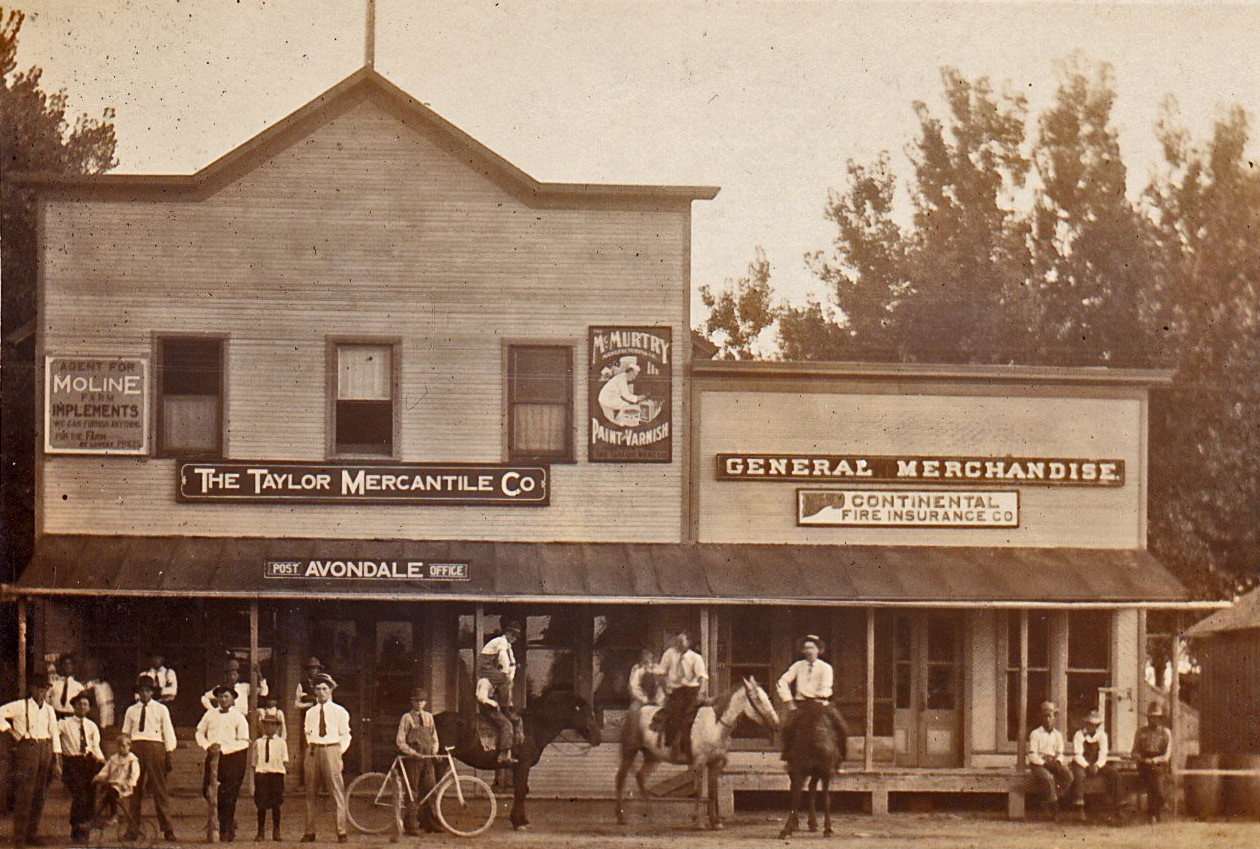Avondale is a farming community in Pueblo County which sits 14 miles east of Pueblo, just south of the Arkansas River. The future site of Avondale was part of Louisiana Territory when the U.S. purchased the territory from France in 1803 for $15 million. Today Avondale’s a pretty small town – i.e., in 2018 the population was 727.
A man named Sam Taylor was the first postmaster. He gave the town its name when he applied for permission in 1892 to open a post office. He decided to name the area Avondale after his birthplace, Stratford-on-Avon, England. It’s likely Sam was the owner of the Taylor Mercantile store on the left, and, as you can see, it incorporates the post office
All the people in the picture appear to be male and most are wearing ties. Even the boy with the bicycle appears to be wearing a colored shirt with a tie. There’s a boy on the left sitting on a tricycle, and one of the two lads on horseback standing partially under the post office sign is sitting on the other’s shoulders.
Note the “Moline Farm Implements” sign on the Mercantile’s store front. This was likely one and the same with The Moline Plow Company, an American manufacturer of plows and other farm implements, headquartered in Moline, Illinois. Moline Plow, founded in the 1870’s, was born out of a lawsuit that a company named Candee and Swan filed against Deere and Company (also of Moline). They won the lawsuit, which allowed them to use the “Moline Plow” name, and they subsequently reorganized to create the Moline Plow Company. In 1929, there was a merger of the Moline Plow Company, the Minneapolis Threshing Company and the Minneapolis Steel and Threshing Company, to form the Minneapolis-Moline Company.
It’s interesting to note that Avondale’s “Taylor Mercantile” was quoted as part of U.S. Senate hearings held in 1912 on “A Duty on (imported) Sugar.” [The all-knowing Google tells me that duties are an indirect tax, as opposed to tariffs, which are a direct tax. Tariffs are imposed on goods, but duties are imposed on consumers. (Seems pretty direct to me!)]
In these hearings, farmers extolled the benefits of making beets part of a crop rotation, e.g., how beets as a rotation crop significantly increased yields in their other crops. This was echoed in Taylor Mercantile’s report that, by rotating beets with other crops on their 120-acre farm, which they had been operating for 14 years, they saw significantly increased yields for hay, oats, wheat, and beans. In reference perhaps to the Avondale area, a Senate footnote about “this section,” states, “It has been customary to follow the ‘gravel pit’ method of farming and grow beets on the same soil year after year without rotation, with the inevitable result that the land finally refuses to produce a paying crop of beets until it has been rested from this crop. As well (sic) try to eat a quail every day for a month as to try to farm in this manner. In both cases nature rebels.” (Not being a hunter, I had to look up the part about quail hunting, and learned that it’s quite challenging, given their speed.)
Having grown up in Fort Lupton, I was tickled to see testimony included in the record from farmers in the Lupton area– i.e., W.A. Davis and Alex Carter of Lupton; F. P. Wylie of Platteville; J. C. Hubbard and John Lee Dale of LaSalle; C.F. Deffke of Greeley; and Rowl Herring of Laporte.
REFERENCES:
- “Can Telling a Story Change the Story?,” by Kristin Jones, The Colorado Trust, at https://www.coloradotrust.org/content/story/can-telling-story-change-story
- Census Reporter at https://censusreporter.org/profiles/16000US0804165-avondale-co/
- Distance Between Cities at https://www.distance-cities.com/distance-pueblo-co-to-avondale-co
- Google search “duty tariff difference.”
- Duty on Sugar, No. 14, Hearings before the Committee on Finance, United States Senate, Sixty-Second Congress, Second Session on H.R. 21213, Approved August 5, 1909, Google Books at books.google.com. https://books.google.com/books?id=RXxZOnRn64sC&pg=PA670&lpg=PA670&dq=taylor+mercantile+avondale+colorado&source=bl&ots=4fDRuDzzI2&sig=ACfU3U2ip3wxvC7Xk5-p92FhQed9vzsW2A&hl=en&ppis=_e&sa=X&ved=2ahUKEwjFhZ_Kqs3oAhWGhJ4KHX7sBI8Q6AEwBXoECAsQOQ#v=onepage&q=taylor%20mercantile%20avondale%20colorado&f=false
- St. Charles Mesa History, Pueblo City-County Library at https://www.pueblolibrary.org/stcharleshistorywall
- The Prairie Gold Rush at http://www.prairiegoldrush.com/menu
- “Trap shooting is fun, but quail hunting’s a real challenge,” by Chad Gillespie, Kitsap Sun, Dec 23, 2004, at https://products.kitsapsun.com/archive/2004/12-23/23597_trap_shooting_is_fun__but_quail_.html
- Wikipedia at https://en.wikipedia.org/wiki/Avondale,_Colorado
- Wikipedia at https://en.wikipedia.org/wiki/Louisiana_Purchase

